As a member of The Daily Signal team, I took offense to The Washington Post’s recent questioning of our “legitimacy” as a news organization.
The Washington Post began its story stating that, “In an age of partisan media, the lines between ‘partisan’ and ‘media’ can sometimes blur.”
I wonder if the reporter has taken a look at just how partisan some of our country’s media behemoths actually are. Here is a summary of the ownership, lobbying, and political contributions of several of America’s largest media companies.
ABC is owned by the Walt Disney Co., which has spent over $70 million lobbying the federal government since 1998. During the 2016 election cycle, individuals and PACs associated with the company contributed $1.6 million to Democrats and $250,000 to Republicans.
NBC is owned by Comcast Corp. In 2014, Comcast spent $17 million in lobbying and hired 128 lobbyists. When it came to the 2016 election cycle, contributions were almost evenly distributed between the two political parties, with Democrats receiving $3.5 million and Republicans $3.3 million.
However, if you look at the contributions related specifically to NBC properties, the vast majority of contributions were to Democrats. The only outlier was NBC Sports.
CBS is owned by CBS Corp., which spent $4,470,000 in lobbying in 2016.
CNN is owned by Time Warner Inc. In 2016, individuals and PACs related to the company gave 87 percent of contributions to Democrats and 11 percent to Republicans. The only year since 1990 that such contributions didn’t heavily favor Democrats was 1996, when contributions were split 50-50.
Though I don’t normally consider the Fox News Channel to be part of the “establishment” media, considering its audience share is now larger than their cable counterparts, I took a look at the campaign contributions.
Fox News is owned by 21st Century Fox. At least when it comes to campaign contributions, Fox appears to be more “fair and balanced” than its competitors. Since 1998 and over 10 election cycles, the corporation has given a majority of contributions to Democrats five times, to Republicans four times, and roughly 50-50 in 2014.
And then there is The Washington Post, which is owned by billionaire businessman Jeff Bezos, founder of Amazon.com.
Among his political donations? A reported $2.5 million was given to support the gay marriage referendum in Washington state. He has also been a vocal supporter of the internet sales tax. The Washington Post editorial pages have reflected similar views on both marriage and taxes.
To say that the aforementioned political contributions are nowhere near “balanced” is an understatement. And while you can’t link every dollar to every instance of bias, most Americans have come to the conclusion that the media is less than trustworthy.
According to Gallup, Americans’ confidence in the media “to report the news fully, accurately and fairly” is at its lowest point in Gallup’s polling history with only 32 percent saying they have “a great deal or fair amount of trust” in the media.
Also of note, a recent Emerson College poll showed voters find the Trump administration “to be more truthful than the news media.” Forty-nine percent of voters considered the administration truthful, but only 39 percent said the same about the news media.
In addition to a lack of trust among American news consumers, technology is playing a role in the changing and broadening media landscape.
According to a 2016 study by the U.S. Bureau of Labor Statistics, there are now more people working in internet/digital publishing (outlets like The Daily Signal) than working at newspapers. And the numbers are pretty stark.
In 1990, there were 458,000 people working in the newspaper industry. Fast forward to 2016, and that number had fallen by 60 percent, to 183,000. On the flip side, the number of people working in internet publishing grew from 30,000 in 1990 to almost 198,000 in 2016.
And, as more and more Americans are going online to get their news (44 percent of U.S. adults now get news on Facebook, according to the Pew Research Center), newspaper circulation continues to decline, and the traditional broadcast networks (ABC, CBS, and NBC) have fewer eyeballs watching their morning programs and evening news broadcasts—1 million fewer than last year.
Perhaps it’s little wonder that what is known as the “establishment” media is feeling, well, a little less established than it used to.
This story was updated to include information about Fox News.



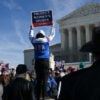








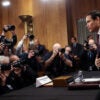

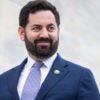
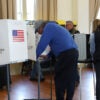

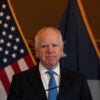














One Reply to “Why the ‘Establishment’ Media Is Finding Itself on Shaky Ground”